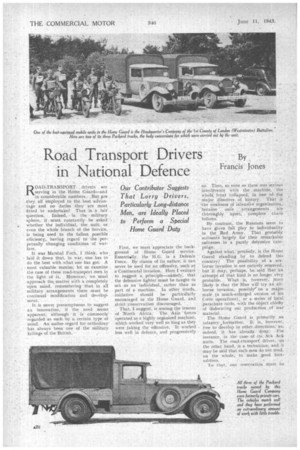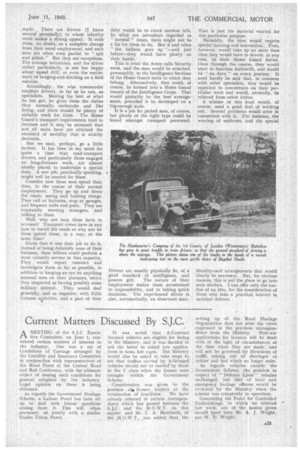Road Transport Drivers By in National Defence Francis Jones
Page 24

Page 25

If you've noticed an error in this article please click here to report it so we can fix it.
Our Contributor Suggests That Lorry Drivers, Particularly Long-distance Men, are Ideally Placed to Perform a Special Home Guard Duty
ROAD-TRANSPORT • drivers are serving in the Home Guard—and
' in considerable numbers. But re they all employed to the best advantage and on duties they are most fitted to undertake? That isa fair question. Indeed, in. the military sphere, it must constantly be asked whether the individual, the unit; or even the whole branch of the Service,
• is being used to the fullest possible efficiency, having regard to the --perpetually changing conditions of warfare.
It was Marshal Foch. , I think, who laid it down that, in war, one has to do the best with what one has got. A • most valuable maxim; let us examine the case of these road-transport men, in the light .of •it. Moreover, We musk approach the, matter with a completely open mind, remembering that in all military arrangements there must be continual modification and development.
• It is never presumptuous to suggest an innovation, if the need seems apparent, although it is commonly regarded as such by a certain type of mind. An undue regard for orthodoxy has always been one of the military failings of the British.
First, we must appreciate the background of Home Guard . service. Essentially, the H.G. is a DefenCe Force. By reason of its nature, it can never be used for an offensive, -such as a Continental invasion. Here I venture to suggest a principle—namely, that the defensive fighter must be taught to act as an individual, rather than as part of a machine. In other words,, initiative should be particularly encouraged in the Home Guard, and strict 'conservatism discouraged.
That, That, I suggest, is among the lessons of North Africa. The Axis -forces operated as a highly organized machine, which Worked very well so king as they were faking the offensive. It worked less well in defence, and progressively so. Then, so soon as there was serious interference with the machine, the whole, front collapsed, in One of the Major disasters of history. That is .,the weakness of intensive organization, because , one -arrangements are thOroughly upset; complete chaos follows: By contrast, the Russians seem to have given full play to individuality. in the :Red_ Army. That probably accountS largely for their remarkable successes in a purely defensive campaign. Against what,' precisely, is the Home Guar,d standing by to defend this country? The possibility of a seaborne invasion is not entirely removed, but it may, perhaps, be. said that 'an -attempt f that kind i's no longer very probable. What is, .however, more likely is that the Hunwill try an airborne invasion, possibly' on a major. scale (a mach-enlarged version of his Crete operations), or a series of local , parachute raids, with the object chiefly of 'dislocating our production of war material...
The Hoine .Guard is primarily an infantry forination. It is, however, free to develop in .other.directions; as, indeed, it has .already done. -For instance, in the 'case of •its. Ack Ack units. The road-transporf driver, On the other hand, is a technician., and it may be said that such men do not tend. on the whole, to make .good foot
soldiers. • . .
To that, one reservation must toe made. There are drivers (I know several personally) to whom infantry work makes a strong appeal. It suits them, no doubt, as a complete change from their usual employment, and such men are often even partial to " spit and polish." But they are exceptions. The average technician, and the driver rather particularly, is not too happy about squad drill, or even the excitement of hedging-and-ditching on a field exercise.
Accordingly,. the wise commander employs drivers, so far as he can, as specialists, Making the best of what he has got, he gives them the duties they normally undertake and like doing, and there should be plenty of suitable work for them. The Home Guard's transport requirements tend to increase and it may be surmised that not all units have yet attained the standard of mobility that is strictly desirable.
But we may, perhaps, go a little farther. It has been in my mind for quite a time that road-transport drivers, and particularly those engaged on long-distance work, are almost ideally placed to undertake a special duty. A new job, practically speaking, I might well be created for them. Consider how these men spend their time, in the course of their normal employment. They go up and down the roads, seeing and hearing things. They call at factories, stop at garages, and frequent cafés and pubs. They are constantly meeting strangers, and talking to them. Well, why not turn those facts to account? Transport crews have in any case to travel the roads so why not let them patrol them, in a way, at the same time?
Given that it was their job to do it, instead of being definitely none of their business, these fellows could perform a most valuable service in that capacity. They would report rumours and investigate them so far as possible, in addition to keeping an eye on anything unusual seen on their journeys, which they suspected as having possibly some military interest. They would deal generally, and as requisite, with Fifth Column activities, and a part of their duty would be to check careless talk.. In what are nowadays regarded as " normal " times, there might not be a lot for them to do. But if and when " the balloon goes up "—and just before—they would have plenty on their hands.
This is what the Army' calls Security work, and the men would be attached, presumably, to the Intelligence Sections of the Home Guard units to which they, belong. Alternatively, they could, of course, be formed into a Home Guard branch of the Intelligence Corps. That would probably be the best arrangement, provided it be developed on a big-enough scale.
It is a job for picked men, of course, but plenty of the right type could be found amongst transport personnel.
Drivers are usually physically fit, of a good standard of intelligence, and possess grit. The nature of their employment makes them accustomed to responsibility, and to taking quick decisions. The experienced driver is also, automatically, an observant man. That is just the material wanted for this particular purpose, •
Naturally, the Men would require special training and instruction. That, however, would take up no more time than they would have to devote, in any case, to their Home Guard duties. Once throtIgh the course, they would start to function forthwith, and would be "on duty" on every journey. It need hardly be said that, in common with other specialists, they would be expected to concentrate on their particular work and would, naturally, be relieved from -other duties.
A scheme of this kind would, of course, need a good deal of working out. Several problems would arise in connection with it. For instance, the wearing of uniforms, and the special identity-card arrangements that would clearly be necessary. But, for obvious reasons, this is not the place to go into such matters. I can offer only the outline of an idea, for the consideration of those who take a practical interest in national defence.




















































